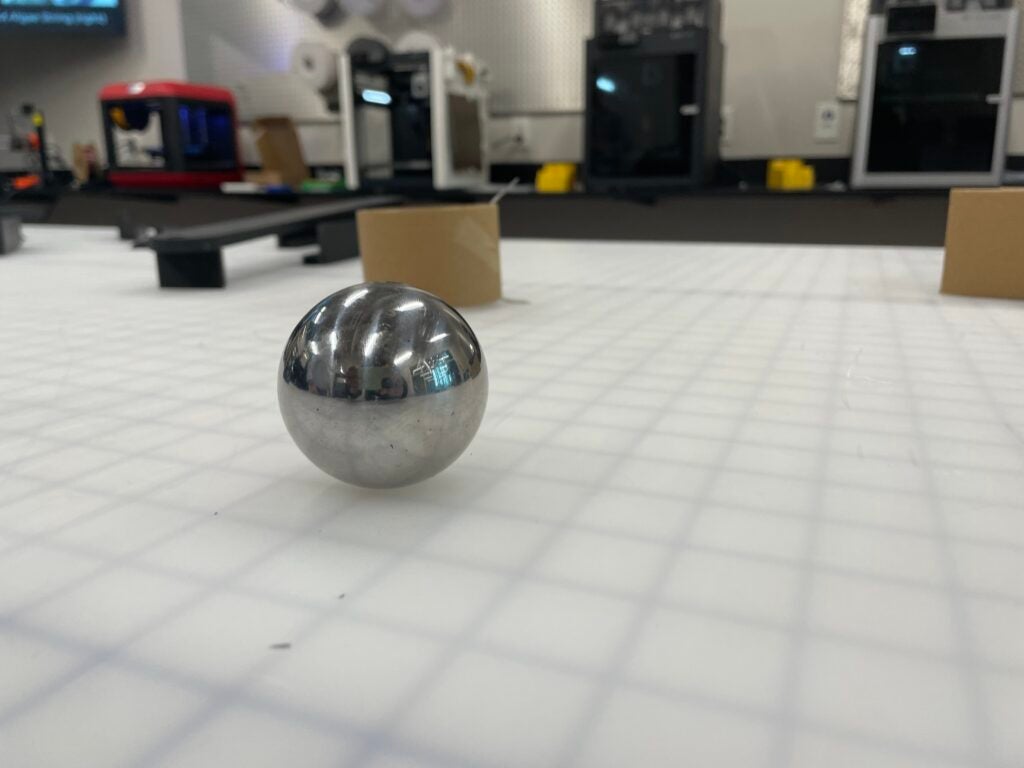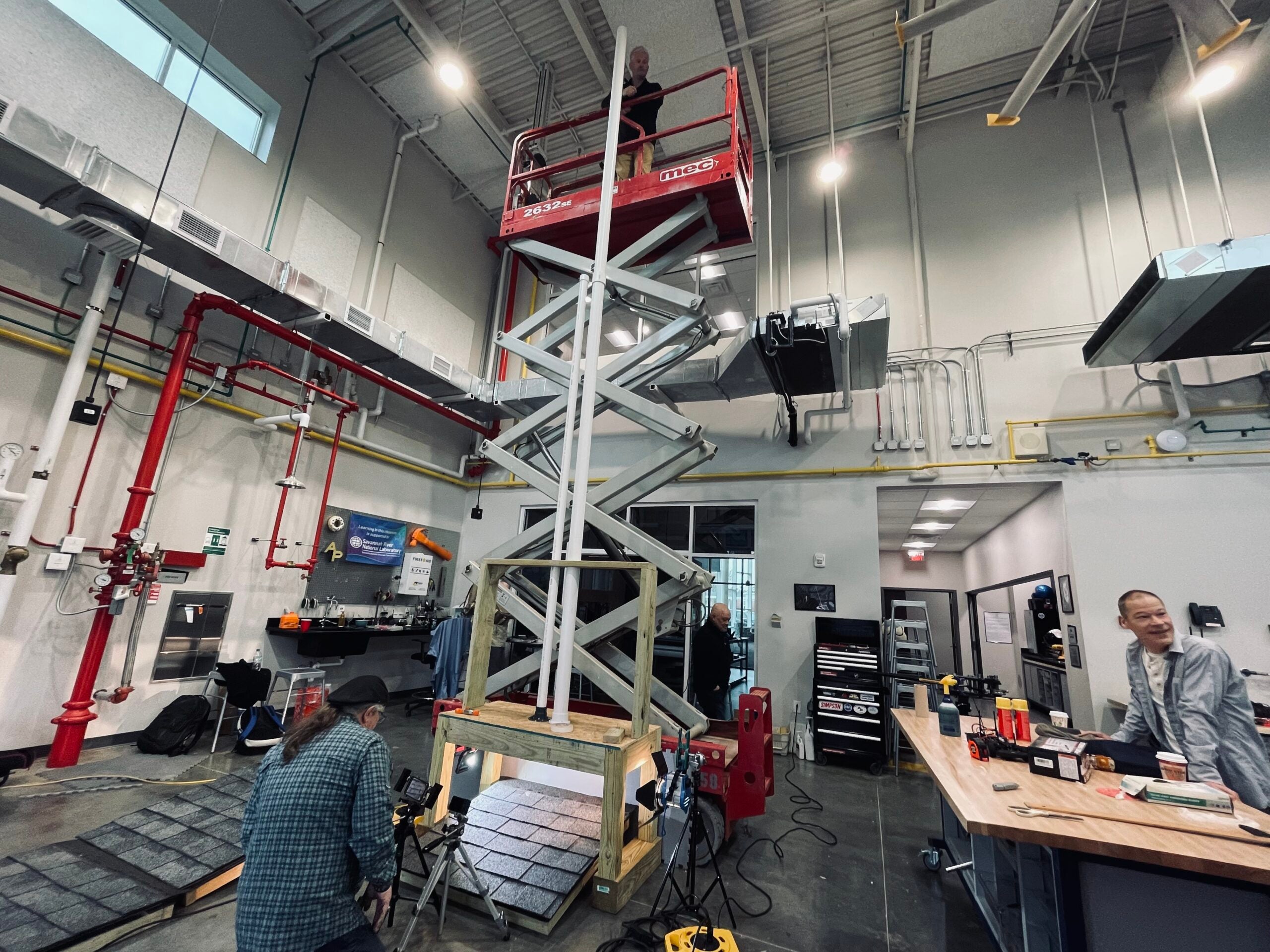Science and business partnered Monday, as researchers conducted a series of tests to determine the effectiveness of a new roof protection product.
Roof Savers, the Evans-based roofing and repair company, is set to release Renueit Rocloc, a water-based coating designed to extend the life and durability of roof shingles by 17 years.
OneSource Organics, the company that developed Renueit, joined Oxford University physicist Rob Johnson at the W. Rodger Giles Institute of Inquiry on the Augusta Preparatory School campus, as he ran tests on the product at Roof Savers’ behest.
Shingle roofs wear over time because the granules—the small pieces of embedded asphalt—begin to shed as the ratio of asphaltenes and maltenes, two key chemical components of asphalt, changes, explained Richard Winget, CEO of OneSource Organics.
“It gets more brittle, and the granules don’t adhere as much,” said Winget. “The process is accelerated, because then it gets greater UV damage, weather damage, etc. So once you start seeing granules at the bottom of your downspout, it’s time to start paying attention to it, maybe looking into the rejuvenation.”
MORE: Skechers to open new store in Augusta Square, this week
The Renueit coating contains void repair tech, which, once the coating is applied, fills the microscopic gaps in the asphalt layer to strengthen adhesion.

To gauge the effectiveness of the coating, Johnson followed testing used by safety research organization UL (formerly known as Underwriters Laboratories), in which a 1.91-pound steel ball is dropped from about 20 feet onto a shingle surface, falling at 90 mph. Afterward, the damage is assessed on the shingles, including measuring the crater and examining granule loss and breakage.
Shingles are rated from Class 1 to Class 4, the latter representing strong resistance, able to withstand normal impacts such as from hailstorms.
Johnson tested a sample of 14-year-old asphalt shingles with the Renueit applied, and a new set of Class 4 shingles without it. He notes that he actually ran a more stringent version of the UL procedure, with a slightly heavier metal ball, dropped from a height just some six inches higher, than recommended by the UL test.
MORE: Regional Library Board votes in favor of reshelving guidelines
“Our version of the test exceeds the actual Class 4 specification,” said Johnson. “Overall, the results were reassuringly as expected. What we found is that the application of the renewal coating can improve the impact resistance of a shingle beyond its original class.”
Renueit, whose patent is currently pending, will be a product used exclusively by Roof Savers. Dan Delarosa, a patent attorney working with Roof Savers and OneSource, and a former forensic chemist, made sure to incorporate the process of development and experimentation into the product’s patent, to safeguard it from competitors.
“I don’t just patent automation. I also patent… the design around it,” said Delarosa, explaining the doctrine of equivalence in patent law. Ingredients of a product, he explains, could possibly be substituted and achieve the same results. “The problem is, once you switch chemicals, you can achieve two out of the three, but the way it works is enough to get you out of infringement. So what I do is I also patent the substitutes. And then the next thing we did is patent the method of manufacture. The method of manufacture is unique.”
Winget developed the base formulation of Renueit some 20 years ago, when a OneSource Organics client requested a product that would be like “Saran Wrap for a house.” The company has been lab testing for improvement since then, leading to this latest iteration of the product invented for Roof Savers.
MORE: Lowes Foods may not becoming to Evans, but still has foothold in CSRA
“I think the future of the product is it’s going to allow people who don’t have the finances to replace their roof,” Winget said. “It’s going to allow people to extend the roof for a fraction of the cost of replacement. So it’s going to help people that don’t have tens of thousands of dollars to replace them.”
Allen Childs, co-owner of Roof Savers, selected the W. Rodgers Giles lab after searching for a potential space with high enough ceilings to perform the tests, initially considering a high school gymnasium.
“I started thinking about it… if I’m going to be using a high school gym, why not get the classes involved in the testing? And so I started doing some research about who had AP physics and physics,” said Childs. He would eventually contact Augusta Prep’s Upper School Headmaster Ryan Clements. “They were kind enough to let us use this building, and their students were able to come in and participate in the testing and observe real work, real world testing, with two scientists and a physicist. So it’s kind of a win-win for everybody.”
Skyler Andrews is a reporter covering business for The Augusta Press. Reach him at skyler@theaugustapress.com.











